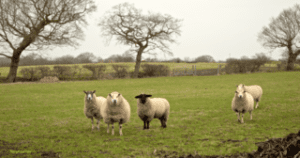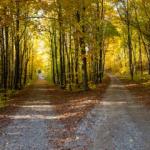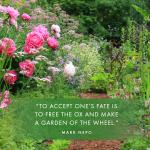
“God clothes the grass in the field, which is alive today but tomorrow is thrown into the fire. So you can be even more sure that God will clothe you.” Matthew 6:28-33 in the NCV Bible emphasizes grass, “the most common food in the world” and the livelihood of 800 million people. Grass is evidence and symbol of God’s great love. We are surrounded by blessings.
Providing
As we enjoy the fresh spring grass with the beauty and wonder of God’s creations, we may reflect on His many forms of gentle, modest blessings.
Testimony
Psalm 23 identifies the Lord as the loving shepherd who “maketh me to lie down in green pastures [and] leadeth me beside the still waters.” Grassy pastures are deep in our Judeo-Christian heritage.
Elder D. Todd Christofferson called God’s compassionate, all-embracing love “a Father’s pure love—universal to all yet personal to each.”
He continued, “Not one of us is a stranger to [God]. We need not hesitate to call upon God, even when we feel unworthy.” He used the phrase “constant, undying love,” allowing us to trust we will be heard.
Sheep, Shepherds, and Savior
When the Savior came into this world, the first to learn of His birth and to visit him were shepherds “in the fields, keeping watch over their flocks.” There was plenty of grass to feed the sheep while the shepherds were watching angels. Love (as well as grass) was all around them.
Scripture accounts and artistic representations don’t feature the grass, but it was there to provide basic needs so the sacred events could focus as they should. We feel surrounded by blessings of love as we read and ponder the scriptures.
Christ continually spoke of himself as “the good shepherd,” telling of His love, tenderness, anxiety, and sacrifice for His sheep. We are comforted to think of ourselves among His lambs. The Savior’s repeated commandment to Peter after His resurrection was “feed my sheep . . . feed my lambs . . . feed my sheep.”
Jesus was, of course, speaking of spiritual nourishment. President Nelson discussed “the godly power available to all who love and follow Jesus Christ”‘ who is “the Divine Exemplar who marked the path that we are to follow.”
But perhaps there might have been also an implication of watching out for physical nourishment. Jesus miraculously increased small amounts of food to feed large multitudes who were listening to his sermons.
Scriptures describing people who moved about—including Abraham and Lot through all the passages in and out of Zarahemla—mention flocks and herds. Some sort of grass would have been available. Grass is found on every continent, including Antarctica. Nephites and Israelites didn’t need it there, but today’s explorers might find it useful.
We cannot understand the reach and magnitude of being surrounded by blessings. Elder Dale G. Renlund proclaimed, “All are invited to partake of the Lord’s goodness, black and white, bond and free, male and female . . . all are alike unto God.” All are “privileged the one like unto the other.”
Guiding
Elder D. Todd Christofferson counseled that in God’s and Christ’s love, “They do not want to leave you ‘just as you are.’ They want you to have joy and success.” As they provide for our basic needs, they guide us in using these blessings to provide for ourselves, enabling us to learn and grow in material and spiritual ways.
Faith Plus Effort
As a shepherd watching his sheep graze on the provided grass, David learned to use his faith and a stone and sling, eventually overcoming Goliath. This blend of faith and effort enabled him to become the military leader necessary to be King of Israel. Many of the psalms he wrote and sang to inspire his people (and the former king) show shepherding as basic to his life and thought.
Elder Patrick Kearon spoke of “the stretching and refining experiences of mortality . . . to learn and grow, to make mistakes, to repent, to love God and our neighbour.” “Stretching and refining” and “learn and grow” bring to mind Nephi (see 1 Nephi 17,18; 2 Nephi 5).
Stretching and Refining
When the Lord commanded him to build a ship, Nephi’s first question was where he could find ore to make tools. The Lord let him know, he found ore, and he made tools. Laman and Lemuel were certain Nephi could not build a ship. So the Lord provided some labor—theirs! With some reminders of His power, of course.
Nephi followed the Lord’s direction. He did not ask for miracles; he made miracles with his obedience and his labor.
When they reached the promised land, the Nephi/Sam team were in the same wilderness as the Laman/Lemuel team. But in their efforts, Nephi and his people were surrounded by blessings.
I did teach my people to build buildings, and to work in all manner of wood, and of iron, and of copper, and of brass and of steel, and of gold and of silver, and of precious ores, which were in great abundance.
God provided the resources; Nephi used them to create what was necessary for religion, culture, and lifestyle to flourish.
Nephi built a temple and taught his people from the brass plates he brought from Jerusalem. The Laman/Lemuel team established their own settlements, but lacking faith in God and willingness to apply effort, their only skill sets seem based in obtaining raw meat and preparing weapons.
President Nelson reiterates, “The Lord loves effort.”
But despite faith and effort, our results often disappoint our expectations. Elder Vern P Stanfill assured, “whatever our best-but-imperfect offering is, the Savior can make it perfect . . . never underestimate the Savior’s power.”
Grass grows very quickly, filling in almost immediately when it is thinned or damaged. The Savior fills in everything. He assured His earthly flock that He would give His life for His sheep, and He did. He offers us eternal life, purchased at a price we cannot imagine. With his infinite love, we lack for nothing.











